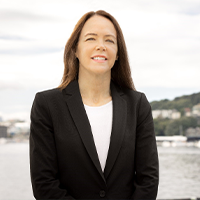Sharon Arroyo | Senior Technical Fellow

The Boeing Company
Seattle, Washington, U.S.
Department: Applied Mathematics, Boeing Research & Technology
Education: B.S. Mathematics, Stanford University, M.S. Operations Research, Cornell University, Ph.D. Operations Research, Cornell University
Career stage: Late
What do you do?
I partner with Boeing engineers to develop mathematical algorithms and tools that are used across Boeing to reduce costs and improve product designs. I lead projects and collaborate with leadership to establish technical direction and strategy for applied mathematical research. I mentor and teach colleagues to expand the use and value of applied mathematics. I have collaborated with colleagues to drive impact in many application areas including supply chain, transportation systems, production systems, and communication networks. I enjoy solving technical challenges that improve business results and seeing my mentees achieve their goals.
What types of skills do you use?
I collaborate with leadership to establish technical strategy at Boeing based on my specialization in operations research and discrete optimization. I work in a dedicated organization that drives understanding and adoption of proven math solutions and tools. Our team collaborates with customers to understand their challenges and aligns the appropriate set of cross-discipline mathematical skills to address them.
How are applied mathematics and/or computational science important to what you do?
The vast size and advanced nature of the engineering work in industry means that difficult mathematics challenges naturally arise. Using expertise in mathematics allows for many of these problems to be tackled in stride.
What are the pros and/or cons of your profession/job?
Pro: Mathematics is inherently multidisciplinary and forms the technical basis for a large portion of many industrial challenges. One of the truly great things about being a mathematician in industry is having a front row seat to many of these exciting challenges.
Con: The time-bound nature of the work. Academia afforded me more time to explore mathematical options, while industry projects are guided by business-driven deadlines. I have come to appreciate the results-oriented nature of industry work.
Does your job offer flexibility?
Yes, I have had the opportunity to collaborate with different teams to develop solutions to interesting challenges across commercial, defense, and space.
What career path did you take to your current position?
I was an assistant professor at Iowa State University for three years. I had the opportunity to consult with industry and realized I enjoyed working with teams on multidisciplinary problems and seeing the real-world impact of math. Due to this experience, I joined the Boeing Math Group and have been a member for more than 25 years.
Was your career path well planned or a result of taking opportunities as they arose?
One must be open to exploring career opportunities as they arise. I consulted with industry while I was an assistant professor, and the nature of the work attracted me to move to industry.
What advice would you give to someone pursuing a similar degree or profession?
Try to get an industrial internship early in your program. Overall, be true to yourself when establishing your career goals. Be flexible in how you achieve them and engage in continuous learning along the way. Enjoy the journey!
Back to List